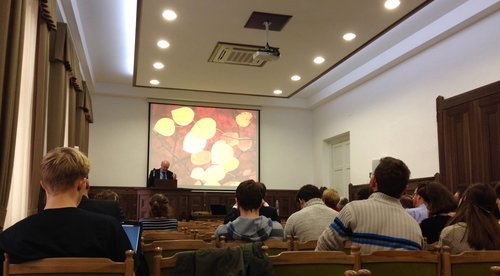In order to strengthen ties between the Presbyterian Church in Ireland and the Reformed Church in Hungary, a conference was held at the Károli Gáspár Reformed University, Theological Seminary in Budapest, Hungary on the 20th of October. Speakers from the two nations gathered, along with faculty from the school, fascinated seminary students, and other interested parties to discuss a wide range of topics relating to the modern church and its sense of mission in the world.
Participants in the conference represented ministers of congregations in cities both big and small, and members of the Irish Council of Churches, the Practical Theology Department in the Reformed Theological Seminary of Papa, and the Refugee Ministry of the Reformed Church in Hungary were also present to give talks. The Presiding Bishop of the Reformed Church in Hungary also made an appearance and shared wisdom about the complex role the church currently plays in the lives of the Hungarian people.
Six topics total were discussed in a back and forth manner between members of the Irish and Hungarian churches, beginning with a speech from an Irish professional on the topic, then going to a Hungarian professional for his thoughts on the topic, and then ending with an open forum with questions from the participants. The two churches, as well as all of those in attendance, gained a greater understanding for the mission of the wider church in a new context with conversations around topics such as the relevance and challenges of ministry in a post-Christendom culture, pastoral care of congregations and ministers, as well as ministry to ethnic minorities and asylum seekers. The dialogue spanned the morning and was eye-opening to people from both nations.
Running themes throughout the conference included topics such as how the church can be an active part in the peace process for the wider world, recovering confidence in one's own personal Christianity, and helping to spread the good word of Christ to others. Speakers also talked about the challenges of building an authentic sense of discipleship, as well as the ongoing importance of pastoral care not just for congregations, but for ministers, their families, and seminarians as well.

Some of the conversations held at the conference were quite timely in today's ministerial atmosphere in both Ireland and Hungary. Irish Minister Robin Brown stressed the importance of "prayerful and practical pastoral care," for ministers in both denominations, saying that it is part of our Christian responsibility to take care of one another as we lead people forward in faith. Later on, the Head of the RCH Refugee Ministry, Kanizsai Nagy Dóra, implored those in attendance to work towards "being church together," with those who are outsiders in our midst, such as ethnic minorities and asylum seekers. She reiterated Minister Brown's sentiments that we are called by God above to treat the outsider as ourself, with love and compassion. Both speakers stressed that providing faithful service to others is a way of showing our obedience and devotion to a just and merciful God.
Many of the topics discussed at the Irish-Hungarian conference were relevant not just to those active in church leadership, but to lay persons in the church as well. Speaking about the challenges of being part of a church in a more secular society, Irish Minister Daniel Kane said that it's imperative that we "recover confidence in the truth of the living God," and regain a sense of community and service moving forward in the world. Hungarian Pastor Lovas András echoed these words and said we, as the church, much prepare God's people to fulfill Her mission in the world by thinking about church in a new way, with a new structure, in our current world. He urged members of both the Presbyterian Church in Ireland as well as the Reformed Church in Hungary to rethink their definition of ministry so that we may then begin to move forward in thinking about new ways of leading and structuring this very ministry. These words of wisdom from our speakers rang true for many, even after the conference was over.
As the speakers took turns volleying back and forth, audience members had the chance to hear deeply personal stories from both an Irish and Hungarian viewpoint on a whole host of topics, helping to further bond not only the people, but the larger denominations as well, from these two great nations.
Speakers at the Irish-Hungarian conference included Presbyterian Church in Ireland members William McCully, Daniel Kane, Nigel Craig, Robin Brown, Ivan Patterson, and Richard Kerr, as well as Reformed Church in Hungary members Szabó István, Lovas András, Bacskai Bálint, Literáty Zoltán, Kocsev Miklós, and Kaniysai Nagy Dóra.
Written by Kearstin Bailey